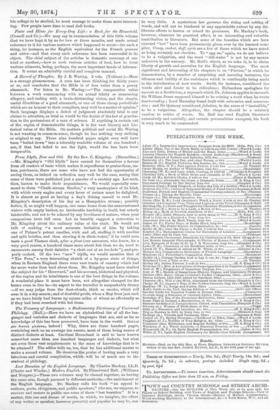Lost Beauties of the English Language. By Charles Mackay, LL.D.
(Ghetto and Winans.) Modern English. By Fitzedward Hall. (Williams and Norgate.)—These two volumes may be classed together, as having the same aim, though pursued in different methods,—the enrichment of the English language. Dr. Mackay calls his book " an appeal to authors, poets, clergymen, and public speakers," who aro, we suppose, to recover and restore to public use some of these "lost beauties." It is a matter, this use and disuse of words, in which, we imagine, the effort of any writer or speaker, however powerful and popular he may be, can do very little. A mysterious law governs the rising and setting of words, and will not be hindered to any appreciable extent by any de- liberate efforts to hasten or retard its processes. Dr. Mackay's book, however, whatever its practical effect, is an interesting and valuable contribution to literature. But some of the beauties which are here counted "lost " have been prematurely given over by the learned com- piler. Crony, cushat, doff, eyrie are a few of those which we have noted as being certainly not obsolete. To "egg on," again, we do not believe to be a vulgarism, and the word " dill-water " is not by any means unknown in the nursery. Mr. Hall's object, as we take it, is to claim liberty of growth and accretion for the English language. The most significant and interesting of his chapters is on "Purism," in which ho demonstrates, by a number of surprising and amusing instances, the idleness and futility of the resistance which is continually being made to the introduction of new words. Swift, for instance, considered the words alert and banter to be ridiculous ; Richardson apologises for narrate as a Scotticism, a reproach which Dr. Johnson applies to succumb. Sir William Jones supposed himself to be coining a word when ho wrote heart-rending ; Lord Macaulay found fault with saturation and conserva- tive; and De Quincey considered fabulous, in the sense of " incredible," to be a vulgarism. Altogether, the chapter should be a salutary caution to critics of words. Mr. Hall has read English literature extensively and carefully, and certain personalities excepted, his book is very much to be commended.


































 Previous page
Previous page